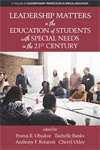
Leadership Matters in the Education of Students with Special Needs in the 21st Century
Edited by:
Festus E. Obiakor, Sunny Educational Consulting
Tachelle Banks, Cleveland State University
Anthony F. Rotatori, Saint Xavier University
Cheryl Utley, Chicago State University
A volume in the series: Contemporary Perspectives in Special Education. Editor(s): Anthony F. Rotatori, Saint Xavier University. Festus E. Obiakor, Sunny Educational Consulting.
Published 2017
This book provides a practical focus and framework for establishing insightful leadership that will enhance the learning of students with exceptionalities in the 21st century by discussing critical leadership dimensions and topics by leading academics. Topics discussed include the following: shifting leadership paradigms for all students in general and special education, district leadership strategies for implementing individualized academic and behavioral student interventions, preparing leaders to work with students with diverse learning needs, critical leadership roles for regular classroom teachers in educating learners with special needs, innovative leadership to increase school completion and graduation of general and special education learners, why psychologists need to be a part of the school leadership team, the importance of culturally responsive leadership in general and special education, the role of school leaders in helping learners with physical and health impairments, school leadership for all students in rural schools, the use of technology by leaders to improve special education services, an international example model of leadership in general and special education, and future perspectives of leadership in special education.
Leadership Matters in the Education of Students with Special Needs in the 21st Century is a critically needed addition to the successful education of students with exceptionalities as it provides much needed and innovative leadership perspectives for effective instructional practices for today's students with special needs. The book can be a model for best practices for school district leadership teams challenged by the multifaceted needs of students with exceptionalities.
CONTENTS
Preface. Shifting Leadership Paradigms for All Students in General and Special Education, Mateba K. Harris, Festus E. Obiakor, Anthony Rotatori and Jessica Graves. District Leadership Strategies for Implementing Effective Individualized Academic and Student Interventions, Rachel Freeman, Lori Newcomer and Dawn Miller. Preparing Leaders to Work With Students With Diverse Learning Needs, Tachelle Banks, Festus E. Obiakor and Bob Algozzine. Regular Classroom Teachers: Critical Leadership Roles in Educating Learners With Special Needs, Shaunita Strozier and Cindy Nelson Head. The Role of School Leaders in Managing Problem Behaviors, Lenwood Gibson. Innovative Leadership to Increase School Completion and Graduation of General and Special Education Learners, Festus E. Obiakor. Why Psychologists Are a Part of the Leadership Team in Special Education, Cindy Nelson Head, Katy B. Green and Shaunita Strozier. Culturally Responsive Leadership in General and Special Education, Cheryl A. Utley. The Role of School Leaders in Helping Learners With Physical and Health Impairments, Eugene Asola. School Leadership for All Learners in Rural Schools, Sunday Obi. The Use of Technology by Leaders to Improve Special Education Services, Jeffrey P. Bakken and Emily C. Bouck. Leadership in General and Special Education: South Africa as a Global Sample, Zandile Nkabinde. Future Perspectives of Leadership in Special Education, Floyd Beachum.
REVIEWS
"Leadership Matters is an academic book citing many references and research findings that take a deep look at the leadership practices the four editors have found to be most effective in addressing special needs learners and students in general. They recognize that there are no quick fixes and talk about “the growing field of implementation science,†which finds that the innovation process can take two to four years or more. The process includes multiple decisions, actions and corrections before a program is successfully implemented and operational." Bob Schultz Brandman University in School Administrator
-
Paperback978-1-64113-008-0
Web price: $45.04 (Reg. 52.99)
-
Hardcover978-1-64113-009-7
Web price: $80.74 (Reg. 94.99)
- eBook978-1-64113-010-3

- EDU026000 - EDUCATION: Special General
- EDU037000 - EDUCATION: Research
- EDU032000 - EDUCATION: Leadership
-
 Autism Spectrum Disorders
Inclusive Community for the 21st Century
Autism Spectrum Disorders
Inclusive Community for the 21st Century
-
 Critical Issues in Preparing Effective Early Childhood Special Education Teachers for the 21 Century Classroom
Interdisciplinary Perspectives
Critical Issues in Preparing Effective Early Childhood Special Education Teachers for the 21 Century Classroom
Interdisciplinary Perspectives
-
 Educating Young Children With and Without Exceptionalities
New Perspectives
Educating Young Children With and Without Exceptionalities
New Perspectives
-
 Enhancing Partnerships in Special Education
Innovative Collaboration, Consultation, and Cooperation
Enhancing Partnerships in Special Education
Innovative Collaboration, Consultation, and Cooperation
-
 Multicultural Education for Learners with Special Needs in the Twenty-First Century
Multicultural Education for Learners with Special Needs in the Twenty-First Century
-
 Special Education During the Pandemic
Considerations for Change in Practice
Special Education During the Pandemic
Considerations for Change in Practice
-
 The Handbook for Aspiring Higher Education Leaders
The Handbook for Aspiring Higher Education Leaders

